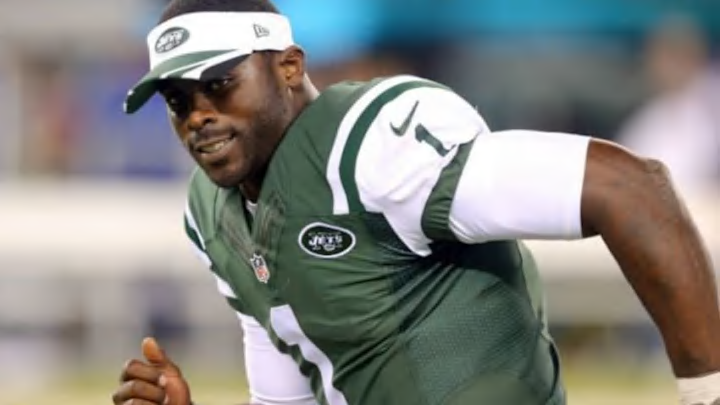New York Jets: Is Michael Vick in the wildcat a good thing?

The year was 2008, and the NFL was a strange place. The wildcat had risen from the depths far below.
The rebirth of the wildcat in the NFL was pioneered by the Miami Dolphins and Ronnie Brown. And somehow six years later that offensive gimmick seems to surface at least once every August. It rises from the dead again, and is often the last desperate grasp for a team that deep down thinks its options for offensive creativity are limited.
That’s the only explanation for why the thought of deploying the wildcat would even be entertained by New York Jets head coach Rex Ryan. He’s the same coach who presided over a flaming mess in 2012 when a wildcat experiment was attempted with Tim Tebow.
This time the wildcat captain would be Michael Vick, the 34-year-old backup behind Geno Smith whose legs still seem to be much younger. Vick has lost a step or three over time and he may lose a few more, but that matters little after he was five steps ahead of everyone in his prime. In the Jets preseason opener vintage Vick arrived, dodging and scrambling for a 15-yard run. He still has it.
That’s why if he’s not the starting quarterback (he won’t be, at least until Geno Smith starts being Geno Smith again), leaving Vick’s speed and elusiveness on the sideline feels wasteful. It feels wrong, and the head coach who’s watching Vick do little more than also watch feels itchy. That’s how the wildcat enters the conversation.
“You’re trying to win the game,” Ryan said last week, after dedicating sections of practice to wildcat plays. “If you think that’s the best thing for your team, then absolutely you’ll consider it.”
Give it some thought, Rex, because that’s part of your job description. To explore every option which could contribute to a win.
Then stop thinking about it, because frequent deployment of the wildcat is wasteful and set to do far more harm than good.
The wildcat is a dated trend, one that was quickly tossed aside by NFL defenses. When the read-option first surfaced a few years ago a comparison was made, with many saying that too would quickly become a forgotten fad. It was a convenient assumption, with a core difference disregarded: the wildcat is a gimmick.
There’s nothing wrong with that, as gimmicks and trickery have existed in football for as long as football has been played. When the Panthers ran the annexation of Puerto Rico, we all celebrated in the streets.
But successful trickery relies on deception, which fades with frequency. If Smith is yanked with any degree of regularity and lined up at wide receiver with Vick on the field, the stench of a rat grows. Vick could pass, sure, but his mere presence on the field alerts the defense that something is amiss.
More importantly, there’s the problem of unnecessary exposure to injury. Tebow may have been a wreck as a wildcat quarterback (3.2 yards per carry), but with a body that was a moving house he could sustain the punishment. Vick is notoriously brittle, and even if we exclude his rookie season and first year back from jail, he’s still played a full 16 games only once. That’s not the ideal body makeup you want to see from a quarterback who would be subjected to more bone rattling through the wildcat.
Then there’s the matter of offensive rhythm being disrupted, which seems to get shrugged off, but it’s a legitimate concern. Smith is a second-year starter who is still developing, and removing him away from his natural position mid-drive or in key game situations won’t help that effort. Putting Smith at wideout or elsewhere with the wildcat deployed gives the Jets one less offensive target if the wildcat trickery ends in a pass.
And with the amount of weapons the Jets now have offensively, why is the wildcat necessary? This is a team that dumped a lot of money on Eric Decker this offseason, and brought in Chris Johnson, adding to a loaded backfield that also includes Chris Ivory and Bilal Powell. They also spent a second-round pick on tight end Jace Amaro.
Even in its prime long ago in 2008, the wildcat was only moderately effective for the Dolphins. They averaged 21.6 points per game, good enough for only 21st despite advancing to the playoffs. Ronnie Brown moved the ball and scored a career high 10 touchdowns while finishing the season with 916 rushing yards. But there was plenty of plodding, with his per attempt rate finishing at 4.3 yards. Brown also had eight games with less than 50 rushing yards that season.
In pains me greatly to admit it, but Donovan McNabb is right about something. The wildcat is garbage, and no one will win here if it’s leaned on regularly. Not Michael Vick, not Geno Smith, and not the New York Jets.